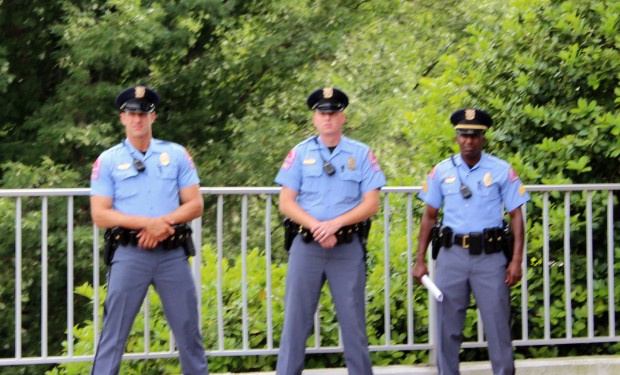Smile, Officer! You’re on Camera!
iPhones, Androids, Blackberries, and digital cameras – what do they have in common? They all have the potential to turn a routine traffic stop into the next big news story. But do ordinary citizens have the right to record police officers during routine stops and other citizen-officer interactions? According to the U.S. Department of Justice, and several Circuit Courts – Yes!
Jonathon Smith, the Chief of the Special Litigation Section of the Justice Department’s Civil Rights Division, issued an open letter last month – directed to the Baltimore Police Department (more on that below) – stating that private citizens, and members of the press share an equal privilege to record police officers in public. “This principal is particularly important in the current age where widespread access to recording devices, and online media have provided private individuals with the capacity to gather and disseminate newsworthy information with an ease that rivals that of the traditional news media,” Smith wrote.
The letter was sent after the American Civil Liberties Union filed a lawsuit against the Baltimore Police Department on behalf of Christopher Sharp, a private citizen whose cell phone was confiscated by BPD after Sharp took a video of police arresting his friend at the 2010 Preakness Stakes horse race. BPD subsequently deleted the video from the phone without Sharp’s permission.
“Recording governmental officers engaged in public duties is a form of speech through which private individuals may gather and disseminate information of public concern, including the conduct of law enforcement officers,” Smith wrote, advocating a sweeping policy adaptation of this First Amendment protection by the Baltimore Police Department, as well as police departments around the country. But, this isn’t just some sweeping opinion coming from the Executive Branch with no precedential backing. Smith cites various Supreme Court and Circuit Court opinions from across the country stating that taping or reporting issues of public concern, like the conduct of police officers, and other public officials, is firmly rooted in long-standing First Amendment principles.
The letter comes on the heels of a widely publicized opinion from the 1st U.S. Circuit Court of Appeals last August, in Glik v. Cunniffe, holding that “Our recognition that the First Amendment protects the filming of government officials in public spaces accords with the decisions of numerous circuit, and district courts.” In Glik v. Cunniffe, attorney Simon Glik was walking past a park in Boston when he noticed several police officers arresting a young man. Glik, after hearing a bystander say they thought the police were using excessive force, began to videotape the arrest. One of the officers turned to Glik, and said, “I think you have taken enough pictures,” and arrested Glik for violating a state wiretap law, and two other state offenses. The charges were later dropped, but Glik filed a constitutional rights action against the department alleging violations of his First, and Fourth Amendment rights.
Anthony Graber, a 25-year-old staff sergeant for the Maryland Air National Guard, had a similar incident in April of 2010. Graber was riding his motorcycle down Interstate 95 with a camera mounted on his helmet to record his trip. An unmarked gray sedan cut him off, and a man wielding a gun, later identified as a plain-clothes state trooper, emerged from the car, and ordered Graber to get off his bike. Graber was cited for doing 80 in a 65-mph zone, and later went home, and uploaded his helmet-cam video of the incident to YouTube. A few weeks later, several officers raided Graber’s home while he was asleep with his wife, and children. He later learned that he had been indicted by a grand jury for violating state wiretap laws by recording the trooper without his consent.
So what’s the big deal about recording a police officer in a public place? According to Portland, Oregon attorney Bert P. Krages, who specializes in the area, police officers are often uncomfortable. “Many officers are uncomfortable that their activities might be displayed on the Internet and otherwise widely distributed. Some also have the impression that photography presents a security risk, and are acting according to a post-9/11 mentality.”3 But the police are in a position of great responsibility, and public trust; shouldn’t they always be acting as if they’re being recorded?
“Police serve a vital function, and most law enforcement officers are very decent people who should be commended. However, the police are in a position to grossly abuse civil liberties, and the bad ones cause a lot of harm,” Krages said. “In many situations, a determination of what actually happened comes down to deciding whether the officer is more credible than a suspect or citizen. Consumer-level imaging, particularly video, has captured images of officers acting very inappropriately in all sorts of situations.”4
In a world where everything is literally a click away, should we really be surprised that videos of police officers in the line of duty make their way online? The duties of a police officer put them under the watchful eye of the public at any given moment. Does it make a difference if the eye is looking through a lens or if what it sees is later seen by millions of people? I think not.
While the Supreme Court has not yet ruled on a case on point, the likely outcome of such a ruling would fall in line with the several Circuit Court opinions thus far: recording police officers in public is a First Amendment right.
Police officers and public officials be warned, you never know where an amateur paparazzo may be lurking with an iPhone 4S, not to mention Siri.

